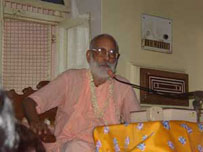[A class on Srila Sanatana Gosvami's Brhat-bhagavatamrta]
Mathura, India: August 14, 2003
Sri Srimad Bhaktivedanta Narayana Maharaja
[The following is the first of a series of lectures given by Parama-pujyapada Srila Bhaktivedanta Narayana Gosvami Maharaja on the 10th chapter of Sri Brhat-bhagavatamrta. These classes were sometimes given in Mathura and sometimes in Vrndavana. Srila Maharaja spoke in Hindi, and there was a simultaneous translation (for those who had headphones) given by Rupa Kisora dasa and intermittent translations given by Pujyapada Madhava Maharaja.]
Sri Pariksit Maharaja described to his mother how Srila Narada Gosvami wanted to reveal to the world the greatest recipient of Lord Krsna's mercy. Narada Muni went from Lord Indra to Lord Brahma; and from Lord Brahma he went to see the Pandavas. He heard from the Pandavas that they are not the real recipients of Krsna's mercy, and in fact they were very unfortunate. They informed him that the real recipient of Lord Krsna's mercy is Sri Uddhava. When Rsi Narada heard this, he became so mad with ecstasy that, simply chanting "Jaya Uddhava, Jaya Uddhava," he even forgot to play his vina. He ran to Dvarakapuri, which is full with large roads, lakes, highways and boulevards, and which is situated in the middle of the Indian Ocean, and which is very difficult to enter. No ordinary person was able to enter there, but Sri Narada Muni, maddened in prema, reached there and entered the astonishingly opulent house of Srimati Rukmini-devi.
Because of the curse of Prajapati Daksa, Narada Muni could not stay in one place for more than a few moments, but because of his great desire to have the darsana of Lord Krsna, he was not impeded by that curse and he went inside the palace to see Him.
The curse had come about in this manner: Prajapati Daksa was a very learned person in the Vedas. He performed varieties of austerities on the order of Lord Brahma, in order to undergo then creation of progeny. He produced many sons whom he sent to perform austerities to create more progeny. By their good fortune, they met with Sri Narada Muni, who instructed them that only bhakti is essential; material existence is unessential. Hearing from Sri Naradaji, bhakti entered their hearts and they never returned home. Instead, they took sannyasa and performed bhajana. * [See Endnote 1] No one knows where they went - maybe to Vrndavana. Daksa became very angry at this, and ordering Sri Narada Muni not to give those types of instructions again, he produced another lot of sons whom he also sent to perform austerities. Rsi Narada Muni caught them also and, receiving from him instructions on bhakti-tattva, they also never returned home. Now Prajapati Daksa became extremely angry and cursed Narada Muni that he may never stay in one place for more than a few seconds. He would only be able to stay at a place for the duration of time it takes to milk a cow. He told Naradaji, "I have given you this curse because everywhere you go, you give such instructions that destroy family life and household situations."
Accepting the curse as a blessing, Sri Narada Muni became pleased and thought, "Oh, now I can go everywhere and preach about the instructions and pastimes of the Lord."
Whenever he desires to have darsana of Lord Krsna, he goes to Dvarakapuri which, being a transcendental dhama (abode), is protected by Sri Krsna Himself and is not under the influence of any mundane curse.
Now, on this occasion, Narada Muni was lost in prema. He was so ecstatic and desirous to see Krsna that his legs automatically took him into the palace of Rukmini, and all eight ecstatic symptoms (asta-sattvika-vikara) such as falling and rolling on the ground, could be seen in his behavior and on his body. On the way to the palace he sometimes cried loudly, as if in distress, sometimes he danced, and sometimes he performed kirtana. Sometimes his bodily hairs stood on end, and sometimes all the eight symptoms manifested at the same time. Even though it may have seemed that he had become mad, this was not actual madness; rather it was the influence of suddha-sattva (the platform of pure goodness or transcendental emotion). Thus, even though he forgot everything about his body, he did not forget the path to Lord Krsna's room. In Srila Sanatana Gosvami's commentary he states that a devotee may forget everything of this world, but he never forgets the path of bhakti. Although it may seem to an ordinary and ignorant person that such a devotee is crazy, he is the most exalted personality and he can never do anything wrong.
Sometimes it is seen that the gopis or exalted Vaisnavas fall to the ground and become unconscious; but their unconsciousness is not like ours, or that of munis or other types of so-called sadhus. When munis enter their samadhi, they forget everything - this world and themselves. But when the gopis or the Vaisnavas go into samadhi, they deeply remember the names, form, qualities and pastimes of Bhagavan Sri Krsna. A kanistha-adhikari cannot understand this. He considers that when one goes into samadhi, it is the same as being under the anesthetic of a doctor - completely unconscious - but this is not at all so. When Vaisnavas go into samadhi, they never forget the pastimes of Krsna.
Relating this to his mother, Pariksit Maharaja said, "O mother, hear this very carefully. Please be very controlled and steady, because now I am going to speak about the mood of separation, and I will also speak about Vraja-prema. Try not to faint; hear this very patiently.
Approaching the room of Srimati Rukmini-devi, Rsi Narada saw a very astonishing sight. Sitting at the threshold of that room were many associates of Krsna, including Uddhava, Srimati Devaki, Rohini-maiya, Rukmini, Satyabhama, and Padmavati. It was late in the morning, about 10 a.m., and Krsna Bhagavan was still sleeping inside His room. Out of consideration for Him, all were gathered outside the room, at the doorstep. All of them were very disturbed, especially Uddhava, who thought that there must be something wrong with Krsna - some sickness or some unhappiness - because He was sleeping so late. When Narada Muni saw the situation, he did not say anything because he could understand that to speak at this time would be very inappropriate.
Padmavati, the wife of Ugrasena and mother of Kamsa, is described by Srila Sanatana Gosvami as bhagavat-priti-harini, she who steals away one's tendency to serve Sri Krsna. In her youth she had possessed extreme beauty. One morning, here in Mathura, she went for a walk in her own garden and was seen by the demon Drumila, who became attracted to her, spoiled her chastity, and as a result of this Kamsa was born. Therefore, Kamsa is not really the son of Ugrasena; he is actually the son of the demon Drumila, and this is why he was a demon and was always against Lord Krsna, the Pandavas and all of Krsna's devotees.
Someone like Padmavati cannot understand Krsna's pastimes; she has her own external understanding. On the other hand, someone like Rohini-maiya, the mother of Sri Baladeva, can understand the real conception. A materialistic person tends to think, "Everyone is like me," and a kanistha-adhakari neither understands the behavior and speech of high class Vaisnavas nor the pastimes of Krsna. An example of this can be sited in connection with Srila Sukadeva Gosvami. Just before he approached the bank of the river where Sri Pariksit Maharaja was sitting, he was surrounded by many ordinary women and
children who were throwing sticks and mud on him in disrespect, because they couldn't understand his exalted position. However, when Pariksit Maharaja and all the rsis and munis who had gathered at the river bank saw him, they stood up, offering great respect, understanding that a maha-bhagavat had come. We should not jump to the conclusion that we understand Vaisnavas or that we understand Sri Gurudeva. This is not good.
During his journey to and arrival at Dvaraka, Narada Muni was absorbed in remembering how Uddhava had done so much service for Lord Krsna. Naradaji is not an ordinary person. He has crossed the stages of prema, sneha, raga and anuraga. These stages are present in him to some degree. Despite this, however, he was considering, "I'm the lowest. Sri Uddhava is great. He is the real recipient of Lord Krsna's mercy."
Pariksit Maharaja continued speaking to his mother, and he now described how Narada's tears soaked the bodies of all sitting near him. Seeing his condition, everyone in the room of Rukmini became astonished and offered respects to him. One of them washed his face with water, attempting to calm him and make him peaceful so that he would not disturb Krsna's sleep. His hairs standing on end, his voice choked, Rsi Narada told them, "I cannot be pacified simply by water. If you really want to save my life, then please give me darsana of the maha-bhagavat Uddhava, or place his foot dust on my head. Only then can my mind and soul become peaceful."
Sri Uddhava himself then asked him, "O Narada, what happened to you? What has caused this apparent madness in you?"
Rsi Narada replied, "O Uddhava, you are the real recipient of Krsna's mercy."
In this way Sri Pariksit Maharaja continues speaking with his mother: Still remembering Uddhava's service to Krsna, and wishing he could serve like Uddhava, tears flowed from Narada's eyes. This is the symptom of a real Vaisnava. Even if someone has done just a little bit of service to Sri Guru, to the Vaisnavas, to Krsna Bhagavan, a real Vaisnava will consider that they have done a great amount of service, and he will become ecstatic. Although the gopis are the highest of all, when they see the peacocks they consider that those peacocks have done an abundance of service and exclaim. "Just see how much love they have for Krsna. When they see Him they become stunned like great sadhus".
The gopis are millions of times greater than the Pulinda-kanyas, the aboriginal girls living in the forests of Vraja. Still, because of their own prema, the gopis consider that the aboriginal girls love Krsna so much more then themselves. They lamented, "Seeing Krsna's footprints on the wet dew early in the morning, these Pulinda girls put the kunkuma from His lotus feet on their bodies. We cannot serve like them."
Narada was thinking that of all the devotees he had yet met, no one had received mercy from Krsna as Uddhava had. In order to attain our life's goal, we must attain bhakti like Narada Muni, and for this we have to work very hard. If we are now in the stage of anisthita-bhakti (unsteady devotional service) we have to endeavor very hard to come to the stage of nistha-bhakti (steadiness). If we are at the stage of nistha, we will have to work very hard to come to the stage of ruci (taste in bhajana).
Anisthita-bhakti has many symptoms. For example, one may be thinking, "Should I become brahmacari, or should I become a sannyasi, or should I marry? Srila Vyasadeva married, so what is wrong in that? The Pandavas also married, so if I marry I can become like them and do bhajana. But on the other hand, Narada never married, and so many of our guru-varga never married - so what should I do? What should I do? Should I live in the matha? Should I take diksa? Or should I stay at home and do bhajana with my mother and father and brothers?"
If we want to become like Narada Muni, we have to follow him. Do not think, "The Pandavas married, so I can also marry and I'll get bhakti like the Pandavas". We should not think like this.
Even though, when he was a Gandarva, Sri Narada was cursed by Lord Brahmaji and became a sudra, * [See Endnote 2] the son of a maidservant, he never gave up his bhajana; he never married or became attracted by any lady. We should try to follow him, and then we can hope to attain the type of devotion he possesses.
[*Endnote 1 - "Influenced by the external energy of Lord Visnu, Prajapati Daksa begot ten thousand sons in the womb of his wife, Pancajani. These sons, who were all of the same character and mentality, were known as the Haryasvas. Ordered by their father to create more and more population, the Haryasvas went west to the place where the River Sindhu (now the Indus) meets the Arabian Sea. In those days this was the site of a holy lake named Narayana-saras, where there were many saintly persons. The Haryasvas began practicing austerities, penances and meditation, which are the engagements of the highly exalted renounced order of life. However, when Srila Narada Muni saw these boys engaged in such commendable austerities simply for material creation, he thought it better to release them from this tendency. Narada Muni described to the boys their ultimate goal of life and advised them not to become ordinary karmis to beget children. Thus all the sons of Daksa became enlightened and left, never to return.
Prajapati Daksa, who was very sad at the loss of his sons, begot one thousand more sons in the womb of his wife, Pancajani, and ordered them to increase progeny. These sons, who were named the Savalasvas, also engaged in worshiping Lord Visnu to beget children, but Narada Muni convinced them to become mendicants and not beget children. Foiled twice in his attempts to increase population, Prajapati Daksa became most angry at Narada Muni and cursed him, saying that in the future he would not be able to stay anywhere. Since Narada Muni, being fully qualified, was fixed in tolerance, he accepted Daksa's curse." (Srimad Bhagavatam 6.5 Chapter Summary)]
[Endnote 2 - "Narada Muni continued: Being invited to that festival, I also joined, and, surrounded by women, I began musically singing the glories of the demigods. Because of this, the prajapatis, the great demigods in charge of the affairs of the universe, forcefully cursed me with these words: "Because you have committed an offense, may you immediately become a sudra, devoid of beauty." (Srimad Bhagavatam 7.15.72)]
Translators: Rupa Kisora dasa and Pujyapada Madhava Maharaja
Transcriber: Bhadra dasi
Typist: Kanta dasi
Editors: Bhadra dasi and Syamarani dasi









